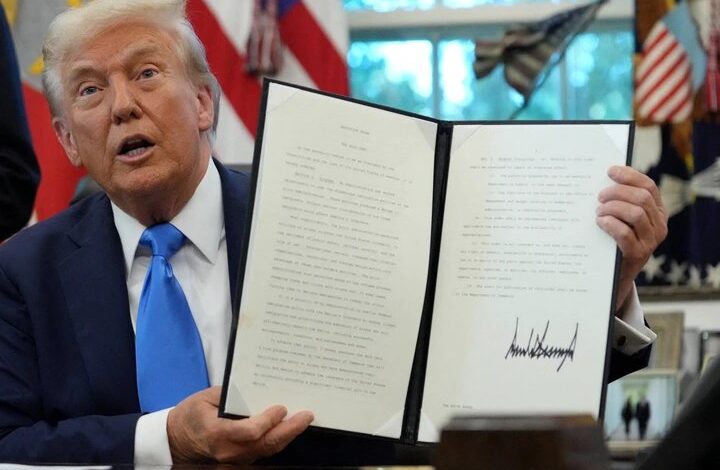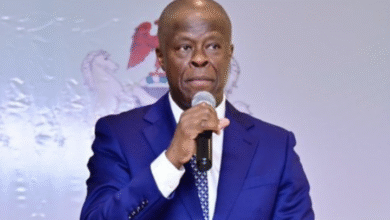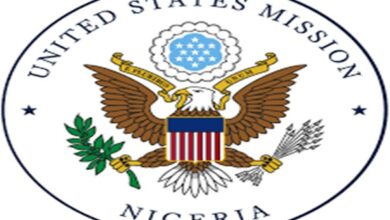Trump’s $100,000 H-1B visa fee sparks global outrage and confusion

(DDM) – The United States government has attempted to calm fears after issuing a controversial executive order imposing a $100,000 fee on new H-1B visa petitions.
Diaspora Digital Media (DDM) gathered that the announcement caused widespread panic among technology workers, multinational corporations, and immigrant families across the world.
The executive order, signed by former President Donald Trump late Friday night, stipulated that the fee would take effect from 12:01 a.m. on Sunday, raising questions about whether it would apply to renewals and existing visa holders.
On Saturday, US Secretary of Commerce, Howard Lutnick, clarified that the fee would apply only to new petitions, not to renewals or current holders.
White House spokesperson Karoline Leavitt also stressed that the new charge was a one-time fee per petition and not an annual levy as initially feared.
The clarification eased some tension but did not stop the flood of confusion that had already swept through the tech industry and immigrant communities.
Technology giants, including Amazon, Google’s parent company Alphabet, Meta, and Microsoft, reportedly warned H-1B visa employees to limit travel until clear guidance was issued.
Several Indian and Chinese professionals deboarded flights on Friday night, fearing they might be denied re-entry or forced to pay the fee upon return.
The San Francisco Chronicle reported stories of families abandoning travel plans at the last minute, while others rushed back into the United States before the deadline.
The H-1B visa program, first introduced in 1990 under the Immigration Act, allows US companies to sponsor highly skilled foreign workers, often in the fields of technology, medicine, and engineering.
Each year, 85,000 visas are issued through a lottery system, with 65,000 open to all applicants and 20,000 reserved for those with advanced US degrees.
India remains the largest beneficiary, with three out of four H-1B visas issued to Indian nationals, cementing the program’s role in linking Silicon Valley with South Asian talent.
Critics of the program argue that it depresses American wages, claiming foreign professionals are willing to work for salaries as low as $60,000 a year compared to the $100,000+ average for US-born tech workers.
However, business leaders and pro-immigration groups insist the program fills critical skill shortages and strengthens America’s global competitiveness.
The US Chamber of Commerce quickly issued a statement expressing “serious concern” about the sudden imposition of the $100,000 fee.
“We are deeply troubled about the impact this measure will have on companies, employees, and families,” the chamber noted, pledging to work with federal authorities to mitigate the fallout.
In India, the Ministry of External Affairs said the new order could have humanitarian implications, disrupting families and creating uncertainty for workers who had planned career moves around the H-1B process.
The ministry confirmed that Indian industry was already studying the measure and exploring possible diplomatic and trade responses.
Immigration attorney Allen Orr, a member of the National Bar Association’s immigration committee, said the order had already disrupted lives.
Orr explained that many skilled professionals outside the US had been told not to travel, forcing companies to delay start dates and pay penalties for canceled housing and flights.
He added that setting a $100,000 entry fee effectively priced out many workers and made it cheaper for companies to outsource jobs abroad rather than bring workers into the US.
Observers note that this is not the first time Trump has targeted the H-1B visa program.
During his first presidency, he repeatedly argued that the program allowed foreign workers to “take American jobs” and floated proposals to drastically reduce the number of visas issued annually.
His latest move is widely seen as an extension of his “America First” economic agenda, which prioritizes domestic workers and industries over global labor mobility.
The new policy could also have diplomatic consequences, particularly with India, whose leaders have historically lobbied Washington to maintain H-1B opportunities for its skilled workforce.
Social media platforms like X (formerly Twitter) and the Chinese app Rednote have been flooded with anxious posts from H-1B holders, many of whom shared personal stories of canceled travel plans and sleepless nights.
Some warned that if the order remains in place for a year, as scheduled, it could push talented professionals to Canada, the UK, or Australia, where immigration policies are seen as friendlier to foreign workers.
Others pointed out that the fee risks driving innovation away from the US, since many of the world’s most successful start-ups were founded or co-founded by immigrants who once entered the country on H-1B visas.
While the executive order is set to expire in one year, the Trump administration retains the power to extend it indefinitely if it determines that the measure serves “US interests.”
For now, many families and employers remain in limbo, unsure how to plan their futures around an immigration policy that could shift again without warning.
Post Views: 13





